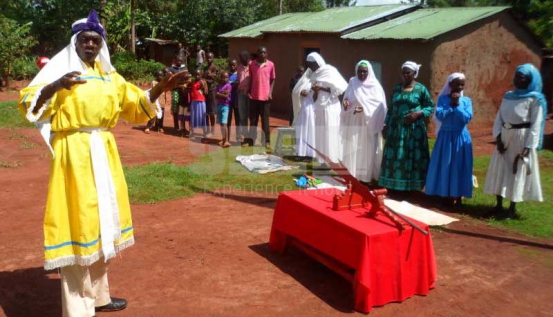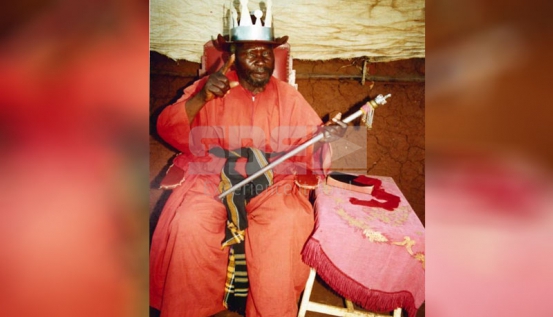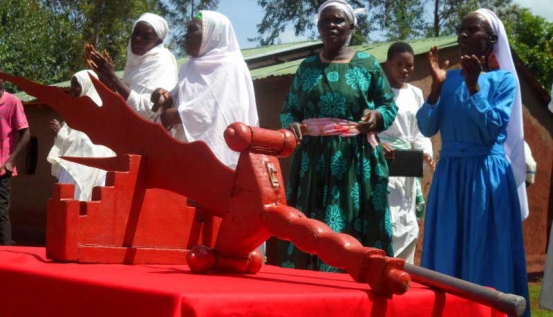
There is something about the Luhya Nation and attachment to food, devotion to home life and religion. It is only in Luhyaland where a man would pass himself as ‘God,’ with a compound that features a ‘jail’ of fire.
The said deity is one Mikaili Jehovah Wanyonyi — who once threatened to unleash HIV/Aids on Kenyans if the government did not advance him Sh3 billion!
Indeed, some of his followers — who eat cold food on Saturdays —believe that although the 91-year-old Jehovah Wanyonyi is said to have died or mysteriously disappeared in 2015, he is still reigning throughout the world and hovers over a big sea. The illiterate man who had 70 wives, they believe, occasionally talks with Pope Francis and US President Barack Obama armed with three chains, a sword and a rod which Jehovah Wanyonyi uses to tie the devil and rule the world.
At Chemororoch village in Uasin Gishu County where Jehovah Wanyonyi was based, some followers believe their land is ‘heaven,’ where ‘Lost Israelites of Kenya’ lived with Wanyonyi, the man who believed Jesus was one of his sons alongside his 95 children, who were often hungry.
Jehovah Wanyonyi’s religious symbols included a red robe, a black or gold cloth tied around his waist, and a red hat with artificial hair attached to it. He rarely removed the hat, but when he did, a balding dome was scorched by the unforgiving sun.
While area assistant chief Paul Bett issued a burial permit, the body of Jehovah Wanyonyi has never been found.
Eliab Masinde, a Kuhani Mkuu (High Priest) in his church, the Lost Israelites, does not believe Wanyonyi’s death was physical since “he assured us that he is safely in another form, safe and secure with another family. He has many wives and hundreds of children,” says Eliab, who also believes that Jehovah Wanyonyi will one day return to Chemororoch village once his mission is accomplished.

But since power abhors vacuum and the death or mysterious disappearance of Jehovah Wanyonyi left a gaping leadership chasm at the Lost Israelites sect which locals call ‘Basiraeli,’ it was inevitable in this area for another ‘God’ to step in.
The largest number of his converts were from the Bareefu clan of the Bukusu sub-tribe of the Luhya community. Eliab Maside, the High Priest, had denied claims that he has been overseeing Saturday church services ever since their god went missing in July last year.
“It is utter blasphemy, God will remain to be God and we cannot say we are him, whether he is present physically or not,” says Eliab who condemned two followers who recently claimed to be successors of Jehovah Wanyonyi.
‘Prophetess’ Elizabeth Akata from Lodwar and ‘Angel’ Joab Muhando from Vihiga County, declared themselves the new leaders of the Lost Israelites of Kenya sect and Jehova’s successors after the latter’s lengthy absence.
Akata claimed she was sent by Jehovah Wanyonyi to lead the Lost Israelites to their promised land, while she remains his intermediary here on Earth.
“Jehova Wanyonyi approached me while I was wandering in Lodwar. He instructed me to come here in Chemororoch village in Uasin Gishu county, where the sect is based, so that I can lead his people since he has assumed another form,” claimed Akata who has teamed up with Muhando to lead a breakaway the faction.
But Eliab dismissed the succession claims, stating that the self-proclaimed prophetess was excommunicated in March this year for desecrating their religion by cohabiting with Muhando.
The two are currently living in a rented shanty in Chemororoch and are not allowed to attend Saturday church services conducted at Jehova Wanyonyi’s compound.
The Lost Israelites of Kenya worship on Saturdays to keep the Sabbath holy.
“Even Jesus died on a Friday and was buried the same day since the following day was Sabbath. We don’t bury on Saturdays either. We also eat cold meals on Saturdays because the Bible directs us not to light fire on Sabbath but just worship,” Eliab told The Nairobian.
Joel Kibet, Jehovah Wanyonyi’s neighbour, says during the church services, Jehovah’s ‘royal’ seat has remained vacant since his death or mysterious disappearance last year.
“The followers are more into religion and don’t care about how the community perceives them. However, the reality they should be dealing with is fighting poverty, because even their god was struggling to make ends meet. Most of them are casual labourers, but the little they get is brought to the High Priest. They have failed to show us where Jehovah is since the reports of his death. He used to be visible and would lead the services,” said Kibet who is a cobbler.
Jehovah Wanyonyi, who sat on a red chair and carried a sword with a red sheath, often told his followers that the colour red represented the end of the world which, according to him, was nigh.
By the time of his disappearance or death, he had lost many followers after failing to heal them of diseases like malaria, typhoid and HIV/Aids, which decimated record numbers, leading to dwindling attendance. This was the reason he relocated from Mt Elgon to Uasin Gishu in 2002 on over 30 acres of land donated by followers.
Another sect, besides Lost Israelites of Kenya, is Dini Ya Roho Mafuta Pole Ya Africa, which is dominant in West Pokot and parts of Baringo counties.
Adherents of Dini Ya Roho dispense with shoes during church services, mostly conducted under trees.
Dini Ya Roho was founded in 1940, but remained officially unregistered by the Registrar of Societies due to that small matter of its ‘archaic and dangerous traditional doctrines’ until 2012, when West Pokot Senator John Lonyangapuo intervened to have it officially recognised.

Julius Raisti, the church’s overall secretary general, told The Nairobian that Dini ya Roho was founded by Lucas Pkiech through instructions from the Holy Spirit to get baptised, whereupon he took the name Arsusu.
“The ‘spirit’ then directed him to preach the gospel after he was taught four unique songs that were loved by the community and which were sang during night dances. The songs brought an experience of infinite power that made people dance in spirit,” Raisti says, adding that Arsusu started commanding a huge following, which offended colonialists, leading to his arrest and six-year sentencing in a Nakuru prison from 1942.
“He preached the word in Korosi and Kolowa areas until April 25, 1950 when, together with our elders who had gone to pray, they were ambushed and shot at in an incident that led to the death of 500 people,” explains Raisti.
According to Apostle Aristi Kapel, the overall leader, Arsusu was among those killed by the colonialists led by GM Taylor, an assistant superintendent of police from Nakuru, and Baringo District Officer Allan James Stephens, who also died in the skirmishes.
The slain followers of Dini ya Roho were buried in a mass grave in Kolowa, while the administrators were interred in a separate grave and a statute in their honour erected.
Aristi says it took pressure from the locals to have a bigger statute erected in honour of the 500 people killed, since the mass grave was apparently oozing blood for over three years, crying for justice. The ‘bleeding’ reportedly stopped when the statue was erected.
The mass grave, besides the bigger statute, has 500 stones with each stone representing the head of slain followers and is considered a holy ground by the church followers.
 The Standard Group Plc is a multi-media organization with investments in media
platforms spanning newspaper print
operations, television, radio broadcasting, digital and online services. The
Standard Group is recognized as a
leading multi-media house in Kenya with a key influence in matters of national and
international interest.
The Standard Group Plc is a multi-media organization with investments in media
platforms spanning newspaper print
operations, television, radio broadcasting, digital and online services. The
Standard Group is recognized as a
leading multi-media house in Kenya with a key influence in matters of national and
international interest.



